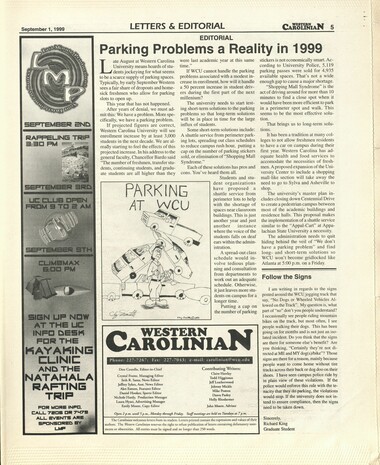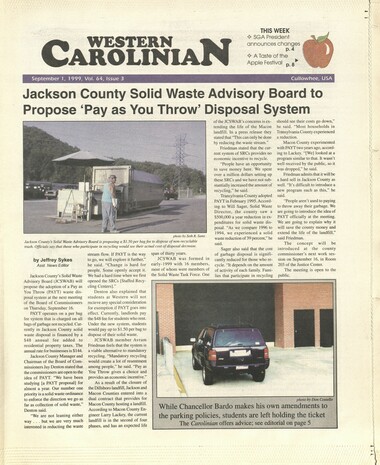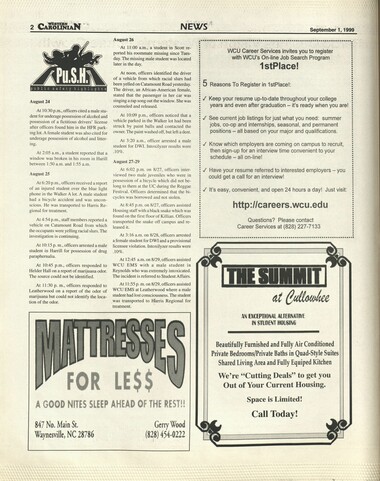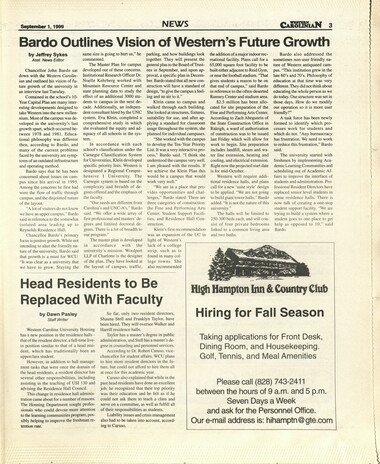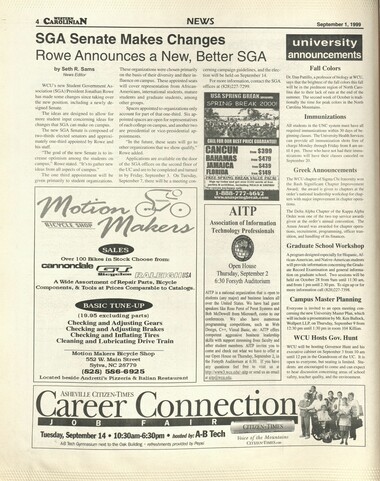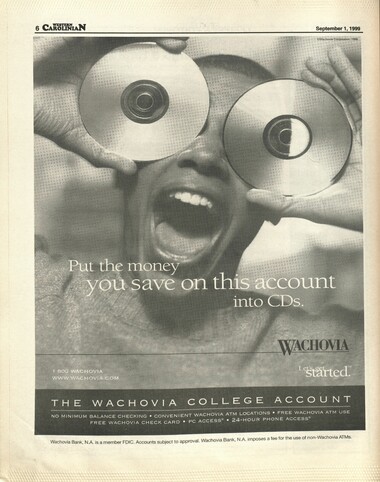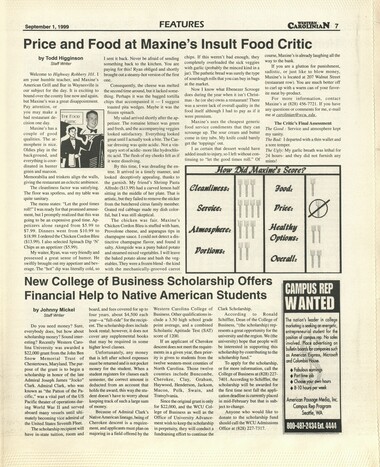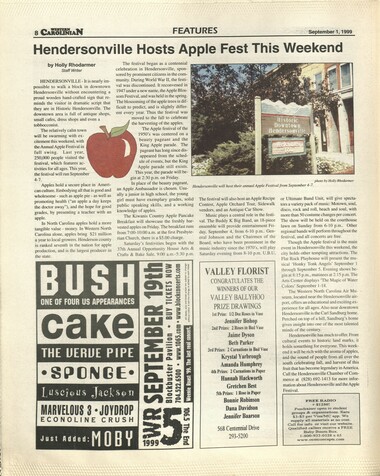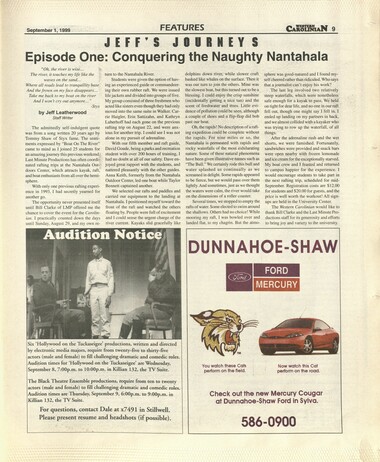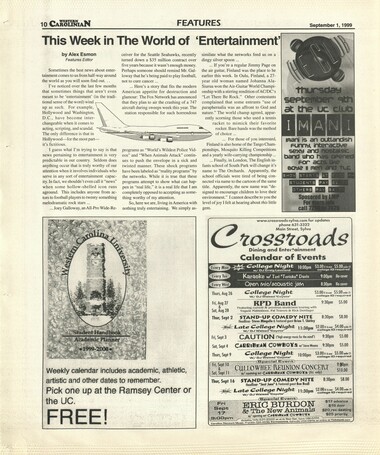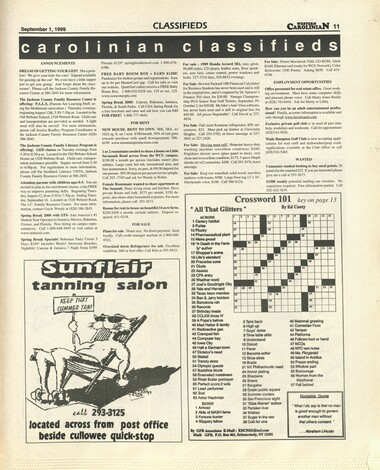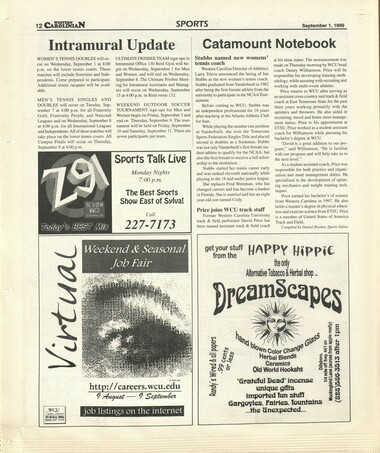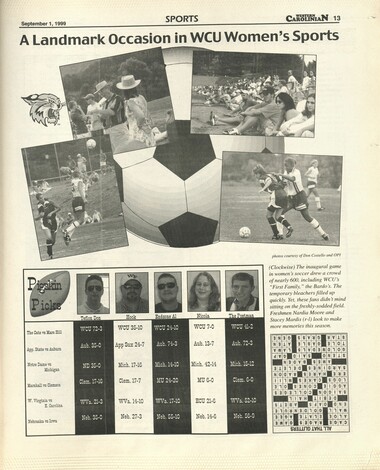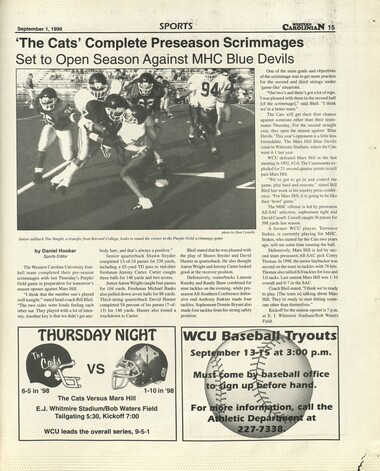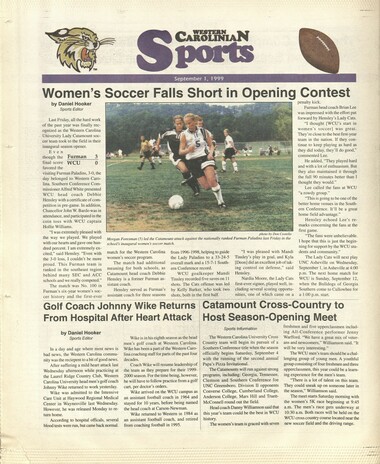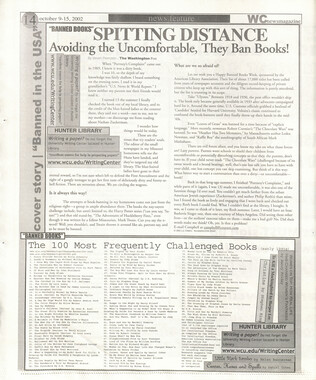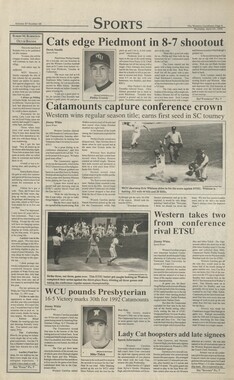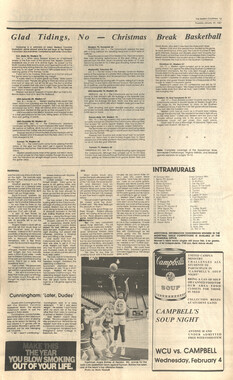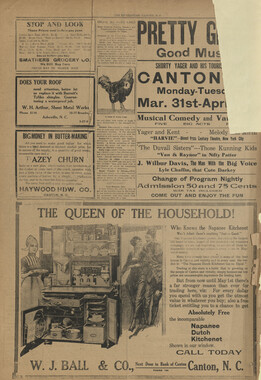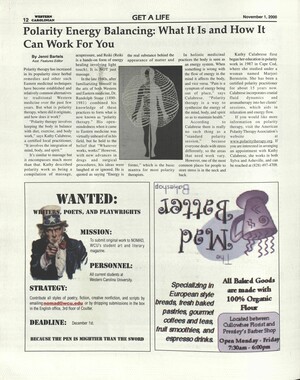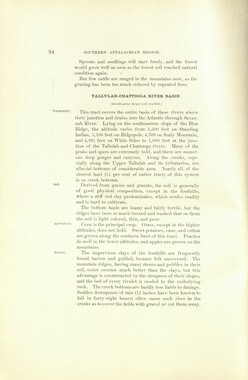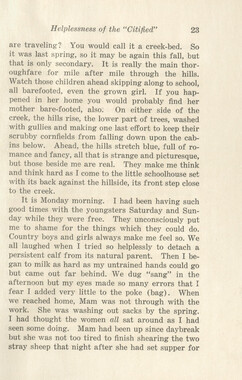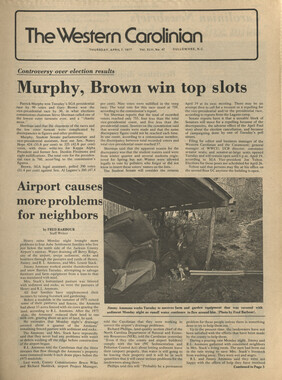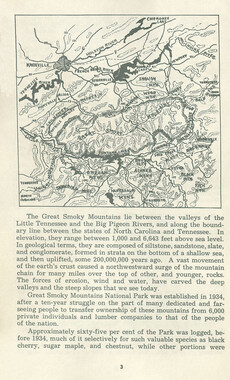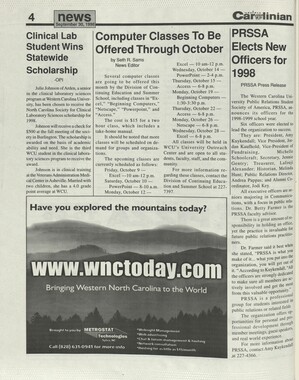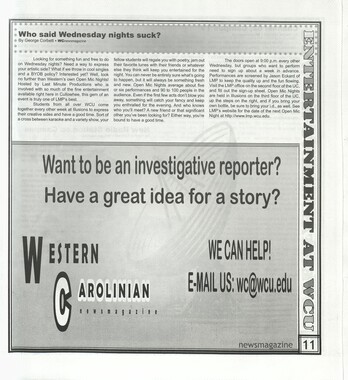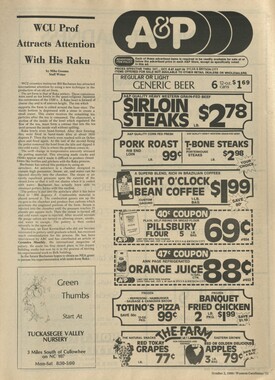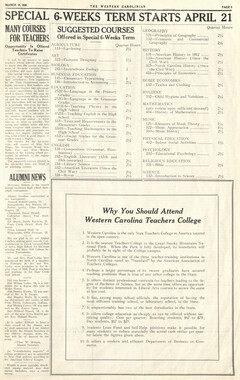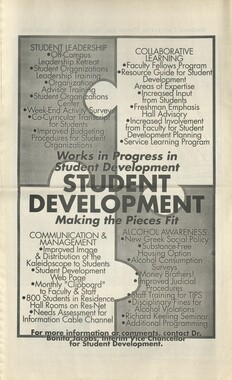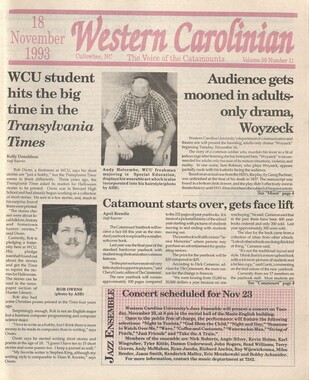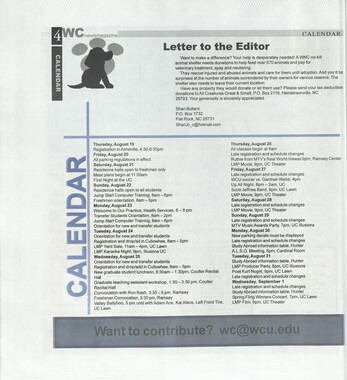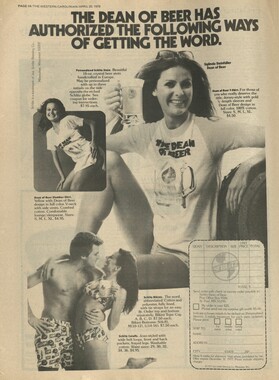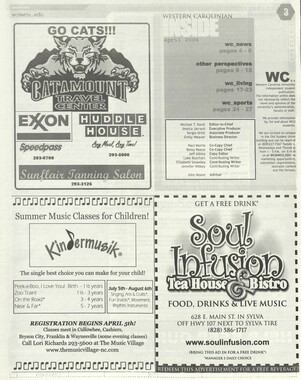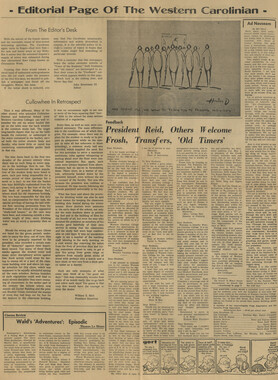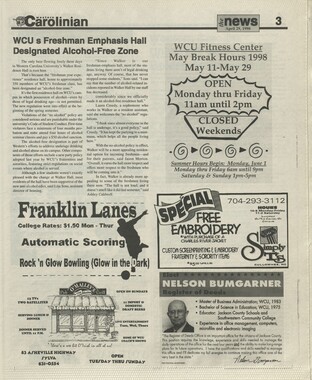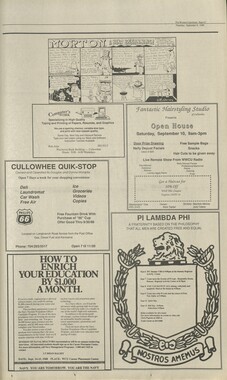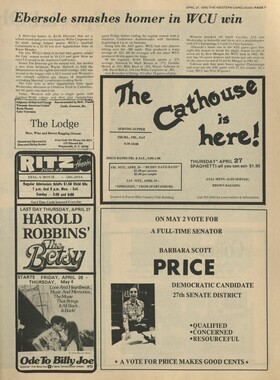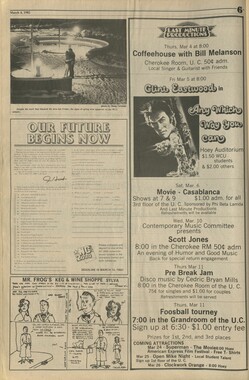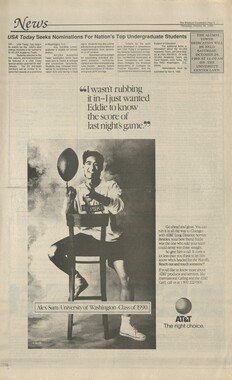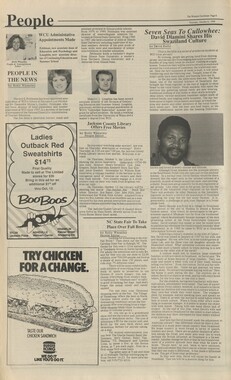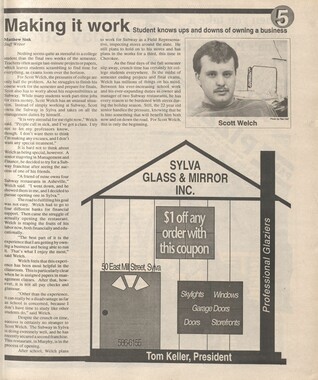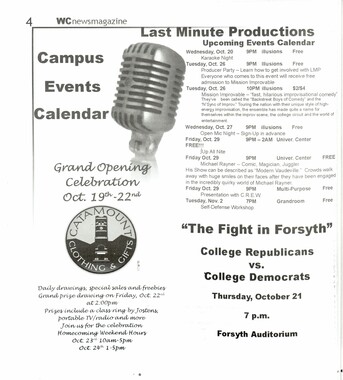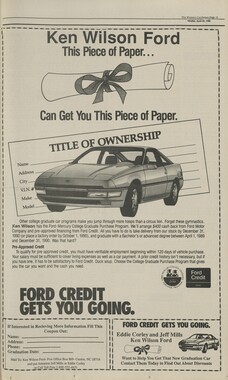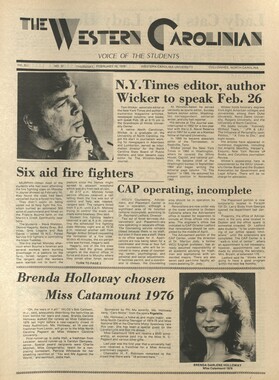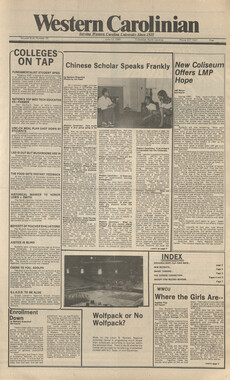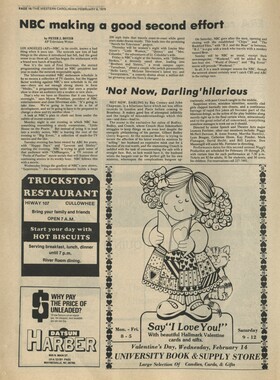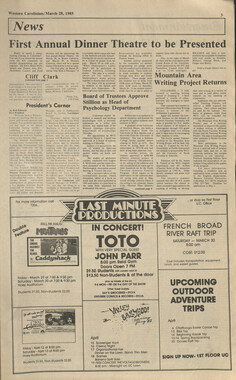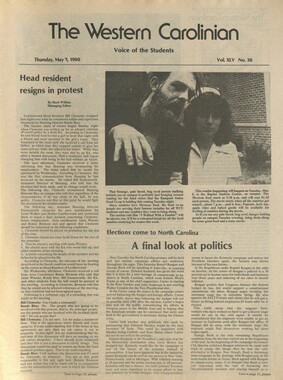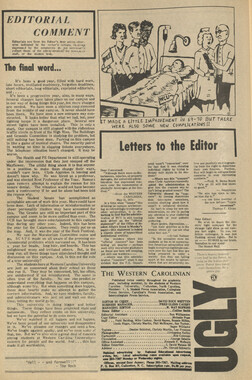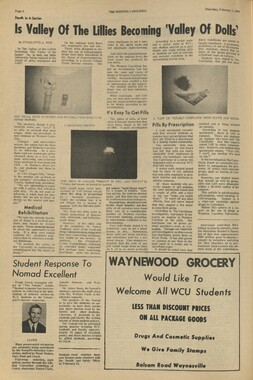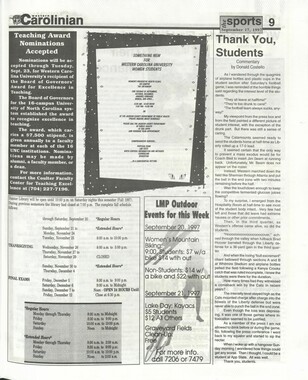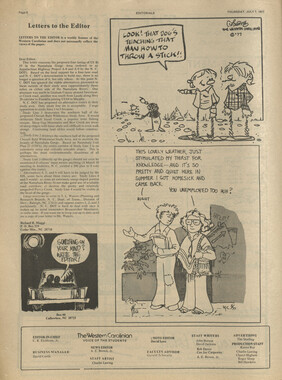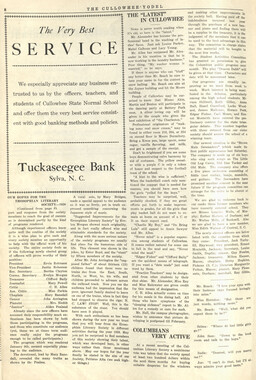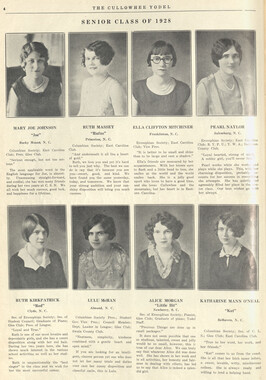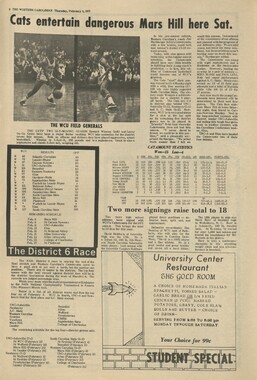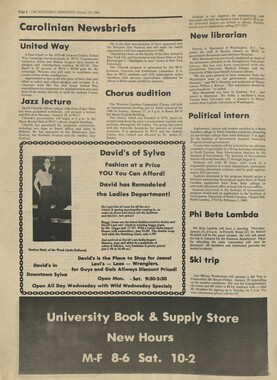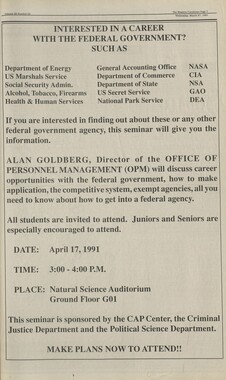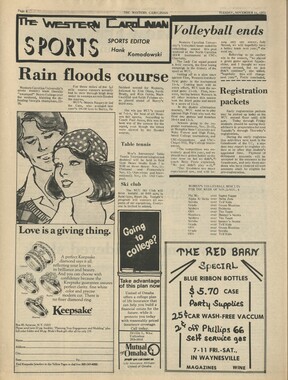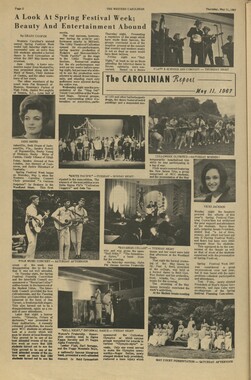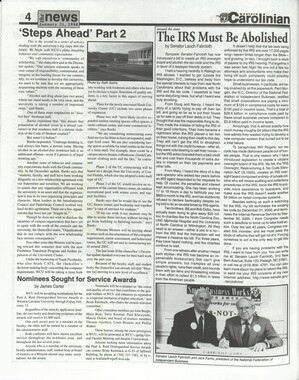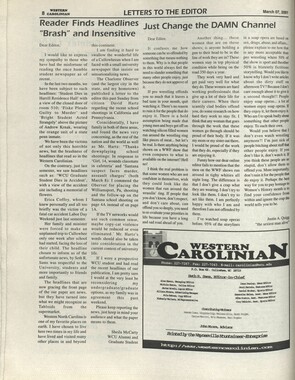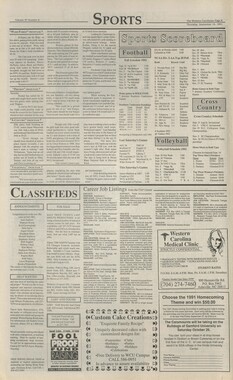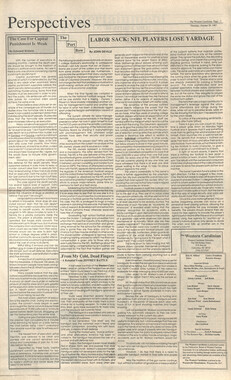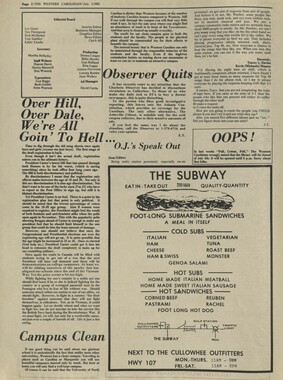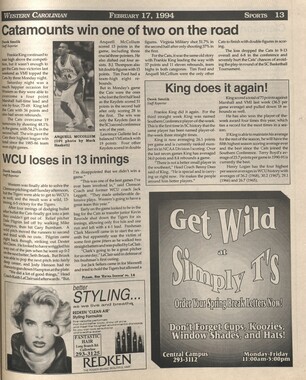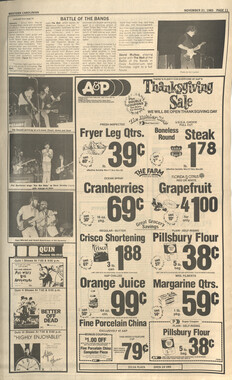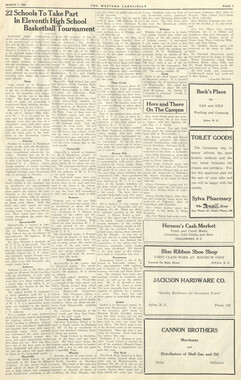Western Carolina University (20)
View all
- Canton Champion Fibre Company (2308)
- Cherokee Traditions (291)
- Civil War in Southern Appalachia (165)
- Craft Revival (1942)
- Great Smoky Mountains - A Park for America (2857)
- Highlights from Western Carolina University (430)
- Horace Kephart (941)
- Journeys Through Jackson (159)
- LGBTQIA+ Archive of Jackson County (85)
- Oral Histories of Western North Carolina (314)
- Picturing Appalachia (6772)
- Stories of Mountain Folk (413)
- Travel Western North Carolina (160)
- Western Carolina University Fine Art Museum Vitreograph Collection (129)
- Western Carolina University Herbarium (92)
- Western Carolina University: Making Memories (708)
- Western Carolina University Publications (2353)
- Western Carolina University Restricted Electronic Theses and Dissertations (146)
- Western North Carolina Regional Maps (71)
- World War II in Southern Appalachia (131)
University of North Carolina Asheville (6)
View all
- Allanstand Cottage Industries (62)
- Appalachian National Park Association (53)
- Bennett, Kelly, 1890-1974 (1388)
- Berry, Walter (76)
- Brasstown Carvers (40)
- Carver, George Washington, 1864?-1943 (26)
- Cathey, Joseph, 1803-1874 (1)
- Champion Fibre Company (233)
- Champion Paper and Fibre Company (297)
- Cherokee Indian Fair Association (16)
- Cherokee Language Program (22)
- Crowe, Amanda (40)
- Edmonston, Thomas Benton, 1842-1907 (7)
- Ensley, A. L. (Abraham Lincoln), 1865-1948 (275)
- Fromer, Irving Rhodes, 1913-1994 (70)
- George Butz (BFS 1907) (46)
- Goodrich, Frances Louisa (120)
- Grant, George Alexander, 1891-1964 (96)
- Heard, Marian Gladys (60)
- Kephart, Calvin, 1883-1969 (15)
- Kephart, Horace, 1862-1931 (313)
- Kephart, Laura, 1862-1954 (39)
- Laney, Gideon Thomas, 1889-1976 (439)
- Masa, George, 1881-1933 (61)
- McElhinney, William Julian, 1896-1953 (44)
- Niggli, Josephina, 1910-1983 (10)
- North Carolina Park Commission (105)
- Osborne, Kezia Stradley (9)
- Owens, Samuel Robert, 1918-1995 (11)
- Penland Weavers and Potters (36)
- Roberts, Vivienne (15)
- Roth, Albert, 1890-1974 (142)
- Schenck, Carl Alwin, 1868-1955 (1)
- Sherrill's Photography Studio (2565)
- Southern Highland Handicraft Guild (127)
- Southern Highlanders, Inc. (71)
- Stalcup, Jesse Bryson (46)
- Stearns, I. K. (213)
- Thompson, James Edward, 1880-1976 (226)
- United States. Indian Arts and Crafts Board (130)
- USFS (683)
- Vance, Zebulon Baird, 1830-1894 (1)
- Weaver, Zebulon, 1872-1948 (58)
- Western Carolina College (230)
- Western Carolina Teachers College (282)
- Western Carolina University (1840)
- Western Carolina University. Mountain Heritage Center (18)
- Whitman, Walt, 1819-1892 (10)
- Wilburn, Hiram Coleman, 1880-1967 (73)
- Williams, Isadora (3)
- Cain, Doreyl Ammons (0)
- Crittenden, Lorraine (0)
- Rhodes, Judy (0)
- Smith, Edward Clark (0)
- Appalachian Region, Southern (2569)
- Asheville (N.C.) (1923)
- Avery County (N.C.) (26)
- Blount County (Tenn.) (169)
- Buncombe County (N.C.) (1672)
- Cherokee County (N.C.) (283)
- Clay County (N.C.) (555)
- Graham County (N.C.) (233)
- Great Smoky Mountains National Park (N.C. and Tenn.) (519)
- Haywood County (N.C.) (3567)
- Henderson County (N.C.) (70)
- Jackson County (N.C.) (4745)
- Knox County (Tenn.) (31)
- Knoxville (Tenn.) (12)
- Lake Santeetlah (N.C.) (10)
- Macon County (N.C.) (420)
- Madison County (N.C.) (215)
- McDowell County (N.C.) (39)
- Mitchell County (N.C.) (132)
- Polk County (N.C.) (35)
- Qualla Boundary (981)
- Rutherford County (N.C.) (76)
- Swain County (N.C.) (2117)
- Transylvania County (N.C.) (270)
- Watauga County (N.C.) (12)
- Waynesville (N.C.) (84)
- Yancey County (N.C.) (72)
- Aerial Photographs (3)
- Aerial Views (60)
- Albums (books) (4)
- Articles (1)
- Artifacts (object Genre) (228)
- Bibliographies (1)
- Biography (general Genre) (2)
- Cards (information Artifacts) (38)
- Clippings (information Artifacts) (191)
- Copybooks (instructional Materials) (3)
- Crafts (art Genres) (622)
- Depictions (visual Works) (21)
- Design Drawings (1)
- Drawings (visual Works) (185)
- Envelopes (73)
- Exhibitions (events) (1)
- Facsimiles (reproductions) (1)
- Fiction (general Genre) (4)
- Financial Records (12)
- Fliers (printed Matter) (67)
- Glass Plate Negatives (381)
- Guidebooks (2)
- Internegatives (10)
- Interviews (815)
- Land Surveys (102)
- Letters (correspondence) (1013)
- Manuscripts (documents) (618)
- Maps (documents) (177)
- Memorandums (25)
- Minutes (administrative Records) (59)
- Negatives (photographs) (5926)
- Newsletters (1290)
- Newspapers (2)
- Notebooks (8)
- Occupation Currency (1)
- Paintings (visual Works) (1)
- Pen And Ink Drawings (1)
- Periodicals (193)
- Personal Narratives (10)
- Photographs (12976)
- Plans (maps) (1)
- Poetry (5)
- Portraits (4535)
- Postcards (329)
- Programs (documents) (151)
- Publications (documents) (2305)
- Questionnaires (65)
- Sayings (literary Genre) (1)
- Scrapbooks (282)
- Sheet Music (2)
- Slides (photographs) (402)
- Songs (musical Compositions) (2)
- Sound Recordings (796)
- Specimens (92)
- Speeches (documents) (15)
- Tintypes (photographs) (8)
- Transcripts (322)
- Video Recordings (physical Artifacts) (23)
- Vitreographs (129)
- Text Messages (0)
- A.L. Ensley Collection (275)
- Appalachian Industrial School Records (7)
- Appalachian National Park Association Records (336)
- Axley-Meroney Collection (2)
- Bayard Wootten Photograph Collection (20)
- Bethel Rural Community Organization Collection (7)
- Blumer Collection (5)
- C.W. Slagle Collection (20)
- Canton Area Historical Museum (2110)
- Carlos C. Campbell Collection (373)
- Cataloochee History Project (64)
- Cherokee Studies Collection (4)
- Daisy Dame Photograph Album (5)
- Daniel Boone VI Collection (1)
- Doris Ulmann Photograph Collection (112)
- Elizabeth H. Lasley Collection (1)
- Elizabeth Woolworth Szold Fleharty Collection (4)
- Frank Fry Collection (95)
- George Masa Collection (173)
- Gideon Laney Collection (452)
- Hazel Scarborough Collection (2)
- Hiram C. Wilburn Papers (28)
- Historic Photographs Collection (236)
- Horace Kephart Collection (861)
- Humbard Collection (33)
- Hunter and Weaver Families Collection (1)
- I. D. Blumenthal Collection (4)
- Isadora Williams Collection (4)
- Jesse Bryson Stalcup Collection (47)
- Jim Thompson Collection (224)
- John B. Battle Collection (7)
- John C. Campbell Folk School Records (80)
- John Parris Collection (6)
- Judaculla Rock project (2)
- Kelly Bennett Collection (1407)
- Love Family Papers (11)
- Major Wiley Parris Civil War Letters (3)
- Map Collection (12)
- McFee-Misemer Civil War Letters (34)
- Mountain Heritage Center Collection (4)
- Norburn - Robertson - Thomson Families Collection (44)
- Pauline Hood Collection (7)
- Pre-Guild Collection (2)
- Qualla Arts and Crafts Mutual Collection (12)
- R.A. Romanes Collection (681)
- Rosser H. Taylor Collection (1)
- Samuel Robert Owens Collection (94)
- Sara Madison Collection (144)
- Sherrill Studio Photo Collection (2558)
- Smoky Mountains Hiking Club Collection (616)
- Stories of Mountain Folk - Radio Programs (374)
- The Reporter, Western Carolina University (510)
- Venoy and Elizabeth Reed Collection (16)
- WCU Gender and Sexuality Oral History Project (32)
- WCU Mountain Heritage Center Oral Histories (25)
- WCU Oral History Collection - Mountain People, Mountain Lives (71)
- WCU Students Newspapers Collection (1784)
- Western North Carolina Tomorrow Black Oral History Project (69)
- William Williams Stringfield Collection (2)
- Zebulon Weaver Collection (109)
- African Americans (390)
- Appalachian Trail (35)
- Artisans (521)
- Cherokee art (84)
- Cherokee artists -- North Carolina (10)
- Cherokee language (21)
- Cherokee pottery (101)
- Cherokee women (208)
- Church buildings (170)
- Civilian Conservation Corps (U.S.) (110)
- College student newspapers and periodicals (1876)
- Dams (107)
- Dance (1023)
- Education (222)
- Floods (61)
- Folk music (1015)
- Forced removal, 1813-1903 (2)
- Forest conservation (220)
- Forests and forestry (1184)
- Gender nonconformity (4)
- Great Smoky Mountains National Park (N.C. and Tenn.) (181)
- Hunting (45)
- Landscape photography (25)
- Logging (118)
- Maps (83)
- Mines and mineral resources (8)
- North Carolina -- Maps (18)
- Paper industry (38)
- Postcards (255)
- Pottery (135)
- Railroad trains (71)
- Rural electrification -- North Carolina, Western (3)
- School integration -- Southern States (2)
- Segregation -- North Carolina, Western (5)
- Slavery (5)
- Sports (452)
- Storytelling (243)
- Waterfalls -- Great Smoky Mountains (N.C. and Tenn.) (66)
- Weaving -- Appalachian Region, Southern (280)
- Wood-carving -- Appalachian Region, Southern (328)
- World War, 1939-1945 (173)
Western Carolinian Volume 64 (65) Number 03
Item
Item’s are ‘child’ level descriptions to ‘parent’ objects, (e.g. one page of a whole book).
-
-
September 1,1999 LETTERS & EDITORIAL .#-* WESTERN ^J _ CaroliniaN 5 mmUmmI 1 iwminriiiwa im/mr** fkm»9:liMmm:. RAPFEL.INB ' mmm! MM tj r^Wrl EDITORIAL mm 5IGN UP NOW AT THE UC INFD DESK FDR THE KAYAKING CLINIC AND THE NATAHALA RAFTING TRIP FOR MORS INFD. CALL 7BDB OR 7H7B ALL. EVENTS ARE SPONSORED LMP Parking Problems a Reality in 1999 Late August at Western Carolina University means hoards of students jockeying for what seems to be a scarce supply of parking spaces. Typically, by early September Western sees a fair share of dropouts and homesick freshmen who allow for parking slots to open up. This year that has not happened. After years of denial, we must admit this: We have a problem. More specifically, we have a parking problem. If projected figures are correct, Western Carolina University will see enrollment increase by at least 3,000 students in the next decade. We are already starting to feel the effects of this projected increase. In his address to the general faculty, Chancellor Bardo said "The number of freshmen, transfer students, continuing students, and graduate students are all higher than they PARKING AT kVCU ■*..%?■ were last academic year at this same time." If WCU cannot handle the parking problems associated with a modest increase in enrollment, how will it handle a 50 percent increase in student drivers during the first part of the next millenium? The university needs to start testing short-term solutions to the parking problems so that long-term solutions will be in place in time for the large influx of students. Some short-term solutions include: A shuttle service from perimeter parking lots, spreading out class schedules to reduce campus rush hour, putting a cap on the number of parking stickers sold, or elimination of "Shopping Mall Syndrome." Each of these solutions has pros and cons. You've heard them all. Students and student organizations have proposed a shuttle service from perimeter lots to help with the shortage of spaces near classroom buildings. This is just another year and just another instance where the voice of the students falls on deaf ears within the administration. A spread-out class schedule would involve tedious planning and consultation from departments to work out an adequate schedule. Otherwise, it just leaves more students on campus for a longer time. Putting a cap on the number of parking C, WESTERN -^T aroliniaN Phone: 227-7267; Fax: 227-7043; e-mail: caroliiiian@wcu.edu Don QosttUo, Editor-in-Chief Crystal Frame, Managing Frxiitor Seth R. Sams, News Editor Jeffrey Sykes, Asst. News Editor Alex Esmon, Features Editor Daniel Hooker, Sports Editor Nichole Hardy, Production Manager Laura Hyatt, Advertising Manager Emily Moore, Copy Editor Contributing Writers: Claire Hawley Todd Higginson Jeff Leadierwood Johnny Mickle Mike Poston Dawn Pasley Holly Rhodarmer John Moore, Advisor Open 2 p.m. until 5 p.m., Monday through Friday. Stuff meetings are held on Tuesdays at 7 p.m. The Carolinian welcomes letters from its readers. Letters printed contain the expressions and values of their authors. The Western Carolinian reserves the right to refuse publication of letters containing defamatory statements or obscenities. All entries must be signed and no longer than 250 words. stickers is not economically smart. According to University Police, 5,119 parking passes were sold for 4,935 available spaces. That's not a wide enough gap to cause a major shortage. "Shopping Mall Syndrome" is the act of driving around for more than 10 minutes to find a close spot when it would have been more efficient to park in a perimeter spot and walk. This seems to be the most effective solution. That brings us to long-term solutions. It has been a tradition at many colleges to not allow freshmen residents to have a car on campus during their first year. Western Carolina has adequate health and food services to accomodate the necessities of freshmen. A proposed expansion of the University Center to include a shopping mall-like section will take away the need to go to Sylva and Asheville to shop. The university's master plan includes closing down Centennial Drive to create a pedestrian campus between most of the academic buildings and residence halls. This proposal makes the implementation of a shuttle service similar to the "Appal-Cart" at Appalachian State University a necessity. The administration needs to quit hiding behind the veil of "We don't have a parking problem" and find long- and short-term solutions so WCU won't become gridlocked like Atlanta at 5:00 p.m. on a Friday. Follow the Signs I am writing in regards to the signs posted around the WCU jogging track that say, "No Dogs or Wheeled Vehicles Allowed on the Track". My question is, what part of "no" don't you people understand? I occasionally see people riding mountain bikes on the track, but most often, I see people walking their dogs. This has been going on for months and is not just an isolated incident. Do you think that the signs are there for someone else's benefit? Are you thinking, "Certainly they're not directed at ME and MY dog(s)/bike"? Those signs are there for a reason, mainly because people want to come home without tire tracks across their back or dog doo on their shoes. I have seen campus police ride by in plain view of these violations. If the police would enforce this rule with the tenacity that they do parking, the violations would stop. If the university does not intend to ensure compliance, then the signs need to be taken down. Sincerely, Richard King Graduate Student
Object
Object’s are ‘parent’ level descriptions to ‘children’ items, (e.g. a book with pages).
-
The Western Carolinian is Western Carolina University's student-run newspaper. The paper was published as the Cullowhee Yodel from 1924 to 1931 before changing its name to The Western Carolinian in 1933.
-
